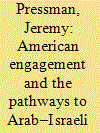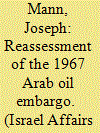| Srl | Item |
| 1 |
ID:
138770


|
|
|
|
|
| Summary/Abstract |
This close empirical study of decades of US efforts to bring peace between Arab states and Israel helps reflect on Arild Underdal and Oran R. Young’s leadership typologies. Distinguishing between coercive leadership based on the incentives and sanctions that robust capabilities make possible and instrumental leadership focused more on talking, skilled mediation, and policy innovation is useful. However, this US mediation demonstrates that the two are not wholly distinct as previously suggested. The narrative of US efforts from Richard M Nixon to William J Clinton, including 22 cases of US involvement in Arab–Israeli mediation, suggests successful US mediation has been based on four factors. US involvement has led to breakthroughs when the US administration was highly engaged and kept at the problem after an initial diplomatic setback; benefitted from an exogenous event; managed that event to the US advantage; and dealt with strong Arab and Israeli partners.
|
|
|
|
|
|
|
|
|
|
|
|
|
|
|
|
| 2 |
ID:
126729


|
|
|
|
|
| Publication |
2013.
|
| Summary/Abstract |
The 1967 war had more influence on the Arab-Israeli conflict than any other factor, and yet the Arab states did not make use of their most efficient weapon. Most of the research on the Six Day War which has touched on the oil embargo blames the embargo's failure on the lack of Arab unity rather than on the inability to set oil policies. Indeed, many researchers believe that the disagreements within the Arab world before the war prevented the oil-producing states from cooperating with their counterparts, such Egypt and Syria, that took part in the war against Israel, and that the embargo therefore did not stand a chance of succeeding. This article seeks to refute the received wisdom that the 1967 oil embargo was a failure because of the lack of Arab unity. By contrast, the success of the 1973 oil embargo was not, as is widely argued, due to Arab unity but to the nature of the oil market at the time.
|
|
|
|
|
|
|
|
|
|
|
|
|
|
|
|